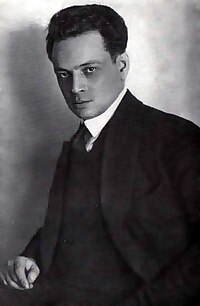Julia Kristeva
Julia Kristeva, was born in June 24, 1941 in Sliven, Bulgaria. She is a philosopher, theorist of literature and feminism, psychoanalyst and Bulgarian-born French writer. She was educated at a French school and then studied linguistics at the University of Sofia. In 1965, at the age of 24, she moved to Paris, studied at the University of Paris and the Ecole Pratique des Hautes Etudes, while publishing articles in journals such as Tel Quel, Critique and Langages. From 1970-1983, she joined the editorial staff of Tel Quel. Currently, she teachesSemiotics in New York State University and the University of Paris VII "Denis Diderot". Her work, of great complexity, usually falls in the critique of structuralism (neo-structuralism and post-structuralism), influenced by Claude Levi-Strauss, Roland Barthes, Michel Foucault, Sigmund Freud and, above all, Jacques Lacan. She is married to the French writer Philippe Sollers.
"Death lives a human life, said Hegel. This is true when we are not in love or analysis." Julia Kristeva make the crossing of structuralism and semiotics. She was influenced by the May of 1968 and Maoism. With that spirit, she spoke at the French Institute in Madrid: “who is not in love nor psychoanalyze or write, is dead."
Julia Kristeva is now far from the major models and paradigms of the social sciences and literary theory that shook the university scene of the sixties and seventies. The abjection, love, melancholy, take their classes and their reflections. And for about seven or eight years everything revolves around his work as a psychoanalyst, consultation and their patients, including the topics she chooses for your university seminars. She was in Madrid to discuss the love-theme of her latest book, and mainly attracted an audience of psychoanalysts, not always satisfied with her original certainly unorthodox approaches. Explain that, indeed, who is not in love nor psychoanalyze or write, is dead.

Love stories Kristeva explains are woven myths and literary figures, in which the writer studied shows its semiotic and psychoanalytic wisdom: Narciso, Don Juan, Romeo and Juliet, the Virgin, the Troubadours, Stendhal, Baudelaire, Bataille, and Freud. In these books about love also becomes especially their theological knowledge density. Julia Kristeva says that she cares deeply the evocations of Karol Wojtyla, performing in her travels or in her speeches at the Vatican. A purpose of individualism, says without the slightest trace of irony: "After all, the need to accept yourself is a commandment of God in the Old Testament: Love yourself."
When asked if Julia Kristeva feels even radical, nods, but not grand gestures and a lot of passion, and the radical claims that her work is precisely the impact on people's lives through the "modest commitment psychoanalysis ", something like an absolutely microscopic and nothing momentous life change, to transform the world by reconciling people to themselves.
Jhony de Jesús Izquierdo







